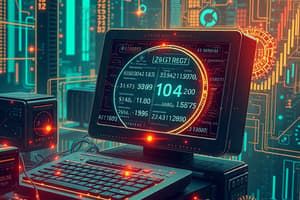Podcast
Questions and Answers
Charles Babbage invented the steam-powered calculating machine capable of calculating number tables. The 'Difference Engine' idea failed owing to a lack of ______ at the time.
Charles Babbage invented the steam-powered calculating machine capable of calculating number tables. The 'Difference Engine' idea failed owing to a lack of ______ at the time.
technology
The world’s first computer program was written by Ada Lovelace, an English mathematician. Lovelace also includes a step-by-step tutorial on how to compute Bernoulli numbers using Babbage’s ______.
The world’s first computer program was written by Ada Lovelace, an English mathematician. Lovelace also includes a step-by-step tutorial on how to compute Bernoulli numbers using Babbage’s ______.
machine
Herman Hollerith created the punch card technique used to calculate the 1880 U.S. census. He would go on to start the corporation that would become ______.
Herman Hollerith created the punch card technique used to calculate the 1880 U.S. census. He would go on to start the corporation that would become ______.
IBM
Alan Turing had an idea for a universal machine, which he called the Turing machine, that could compute anything that could be computed. The Turing machine is known as a theoretical device that manipulates symbols on a strip of tape according to a table of ______.
Alan Turing had an idea for a universal machine, which he called the Turing machine, that could compute anything that could be computed. The Turing machine is known as a theoretical device that manipulates symbols on a strip of tape according to a table of ______.
J.V. Atanasoff and graduate student Clifford Berry devise a computer capable of solving 29 equations at the same time. The first time a computer can store data in its primary ______.
J.V. Atanasoff and graduate student Clifford Berry devise a computer capable of solving 29 equations at the same time. The first time a computer can store data in its primary ______.
A computer is an electronic machine that collects information, stores it, processes it according to user instructions, and then returns the ______.
A computer is an electronic machine that collects information, stores it, processes it according to user instructions, and then returns the ______.
A computer is a programmable electronic device that performs arithmetic and logical operations automatically using a set of instructions provided by the ______.
A computer is a programmable electronic device that performs arithmetic and logical operations automatically using a set of instructions provided by the ______.
Early Computing Devices: ABACUS, Napier’s Bone, Pascaline, Stepped Reckoner or Leibniz wheel, Difference Engine, Analytical Engine, Tabulating machine, Differential Analyzer, ______.
Early Computing Devices: ABACUS, Napier’s Bone, Pascaline, Stepped Reckoner or Leibniz wheel, Difference Engine, Analytical Engine, Tabulating machine, Differential Analyzer, ______.
A computer is an electronic machine that collects information, stores it, processes it according to ______ instructions, and then returns the result.
A computer is an electronic machine that collects information, stores it, processes it according to ______ instructions, and then returns the result.
A computer is a programmable electronic device that performs ______ and logical operations automatically using a set of instructions provided by the user.
A computer is a programmable electronic device that performs ______ and logical operations automatically using a set of instructions provided by the user.
Flashcards are hidden until you start studying
Study Notes
Computing History
- Charles Babbage invented the steam-powered calculating machine, the 'Difference Engine', capable of calculating number tables.
- Ada Lovelace, an English mathematician, wrote the world's first computer program, including a step-by-step tutorial on how to compute Bernoulli numbers using Babbage's Analytical Engine.
- Herman Hollerith developed the punch card technique, used to calculate the 1880 U.S. census, and went on to start the corporation that would become IBM.
- Alan Turing conceived the idea of a universal machine, the Turing machine, which could compute anything that could be computed, by manipulating symbols on a strip of tape according to a table of rules.
- J.V. Atanasoff and Clifford Berry developed a computer capable of solving 29 equations simultaneously, with the ability to store data in its primary memory.
Definition of a Computer
- A computer is an electronic machine that collects information, stores it, processes it according to user instructions, and then returns the result.
- A computer is a programmable electronic device that performs arithmetic and logical operations automatically using a set of instructions provided by the user.
Early Computing Devices
- Early computing devices include the Abacus, Napier's Bone, Pascaline, Stepped Reckoner or Leibniz wheel, Difference Engine, Analytical Engine, Tabulating machine, and Differential Analyzer.
Studying That Suits You
Use AI to generate personalized quizzes and flashcards to suit your learning preferences.




